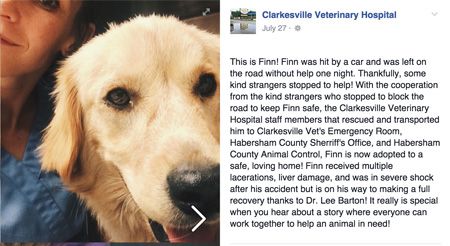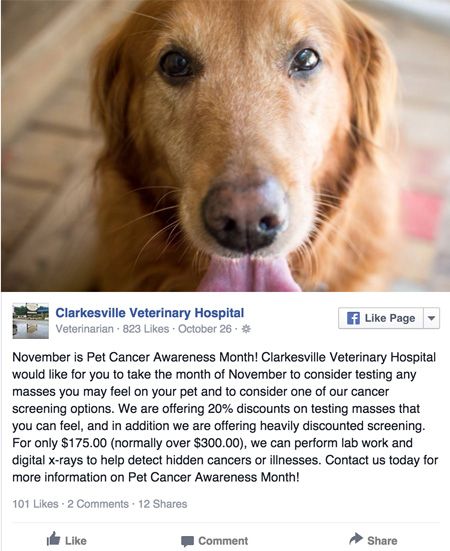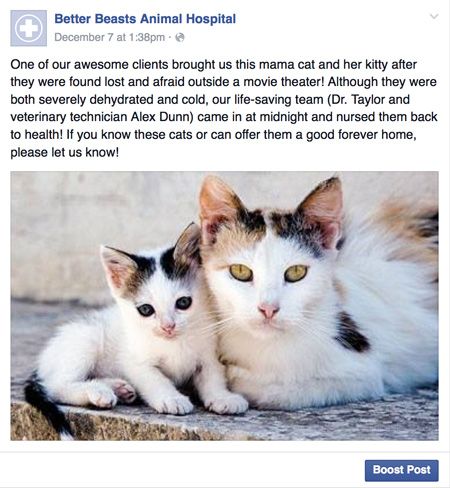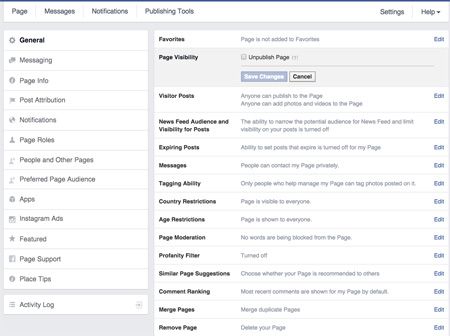Facebook is your veterinary practice's frenemy
Learn how to harness Facebook's strengths and limit your vulnerabilities.
Facebook is not only one of my advertising methods, it's my primary-and most effective-one. I spend less than $100 per month and reach an average of 30,000 current and potential clients with targeted messages. But if this sounds too easy to believe, that's because it is.
Facebook can be an incredibly useful tool, but practices should be aware of the opportunities it offers and the threats it poses. Here are the four tricks I use to tame what can be an unpredictable beast …
1. Share success stories
Most people love happy endings and cute animal photos, so combining the two is always a hit. I manage an eight-doctor 24/7 emergency hospital, so I have plenty of opportunities to post stories of dramatic, lifesaving cases my clients love. Every 10 days I'll choose the story of a patient who was hospitalized in my ICU and restored to health because of my veterinary team's heroics.
Here's my process for vetting cases that I promote on Facebook:
1. Ensure the case has dramatic aspects that would make it popular.
2. Get client permission.
3. Review the medical record and ensure nothing unusual was performed and everything was textbook. Since I have such a large doctor staff under me, I have several of them read the article for accuracy and screen for medical negligence.
First, make sure that you have the client's permission to use their animal in your marketing materials. Then write a post about 250 words long that contains key words or phrases such as “severe,” “administered” or “lifesaving procedure.” I'll name the doctors and veterinary assistants involved and use pictures of the patient in the ICU and after recovery. If we took any radiographs, I use them. Assembled together as a collage, the post is a compelling reason for current and prospective clients to “like” or “share” it and promote my hospital.
Making the situation sound dramatic is a major part of the clients loving it, but a little light humor is also effective. For example, gently remind the patient not to repeat the mistake that led to the predicament.
Don't forget you're not submitting the post to a medical journal, and your target audience doesn't have a medical degree-you're lucky if they have a few seasons of “Grey's Anatomy” under their belts. Also, consider the average attention span of your crowd.

Alex shared the story of a dog he later adopted.
2. Promote monthly specials
I've had success offering free or discounted screenings during awareness months for dental health, senior wellness and heartworms. These could be discounted services, if that's a strategy your practice uses. Or these could also be special freebies, such as handing out a refrigerator magnet that lists your hospital info and some common household pet toxins for Pet Awareness Month.

Alex promotes his practice's monthly specials on Facebook.
3. Boost posts
Every time you publish a post you have an option to “boost” its visibility. For as low as $1, you can have Facebook promote your post in the News Feeds of people who haven't previously liked your page. You can focus on users by location, sex, age range and interests. After boosting a post, you might see an increase in the number of people “liking” it and your page.
You could also have Facebook boost your practice's page. This allows you to pick a target radius to advertise within and blanket your area with your name.

Using this post from a fictional practice, you would click on "Boost Post" for your own Facebook post.
4. Prepare for the worst
Just remember, danger may lurk behind Facebook's flashy features. Facebook advertising's primary weakness is the ability of a person to focus the wrath of others to post negative reviews and comments on your Facebook page.
We've seen this in the national news with the case of the Texas DVM, an alleged feral cat and an arrow. But I've also seen this manifest itself locally with an unsatisfied client with Facebook-savvy friends. A client who was upset about a surgical case with unexpected complications used her angry accomplices to overwhelm the clinic's page with posts. The result: This brought the practice's average review down significantly and left a nasty string of comments on the page.
Protecting yourself from these issues can be time-consuming. You should keep a constant eye on your Facebook page, because a tsunami of posts can flood your page at any moment. And it pays to be aware of any comments or reviews to nip problems in the bud before they gain momentum. Smartphones make it easier to monitor social media because you can receive notifications when something is posted on your clinic's page.
The top two negative situations you may encounter on Facebook: a raid of negativity or one negative comment or review.
The quickest way to manage a raid is to “unpublish” your page. This will make your page invisible until you're confident the heat has died down. There are no long-term consequences, and most clients won't realize anything happened, because most of them discover your posts in their News Feed.

Go to Settings for your practice's Facebook page and click on Edit next to Page Visibility to unpublish your page.
How do I know it works?
I measure Facebook marketing success by running new client reports and comparing them to previous years. To measure success in specials I'm running, I create a special code in my practice management software and run a report to see how many times it's performed.
It's well-known correlation doesn't equal causation, so it can be difficult to say 100 percent that my surge in new clients and success with specials is completely because of Facebook. But I can be confident because I suspended all my other advertising methods during my initial research period to get accurate results on Facebook's usefulness.
To handle a negative review or comment, establish an Internet Relations Committee that consists of the hospital's highest managers, the doctor and staff involved with the complaint, and whoever manages your Facebook page. Plan a meeting within 24 hours of the posting to discuss how to respond, but always lead with, “We are incredibly sorry for your negative experience.” Depending on the legitimacy of the complaint, you may choose to take a defensive stand. Or if you are truly at fault, I recommend writing in your reply that you'll be in contact to discuss the situation. This doesn't admit guilt, but it does convey to those reading the review that you're taking action to correct this client's concern.
I have yet to receive any negative comments or reviews on my Facebook page that have turned into something I can't handle. Often, we have been able to turn them into a learning experience for other clients reading my responses.
Committing to running a clinic Facebook page may seem daunting. The payoff: Better client engagement and more visits.
Alex Espinosa is the practice manager of Clarkesville Veterinary Hospital in Clarkesville, Georgia.